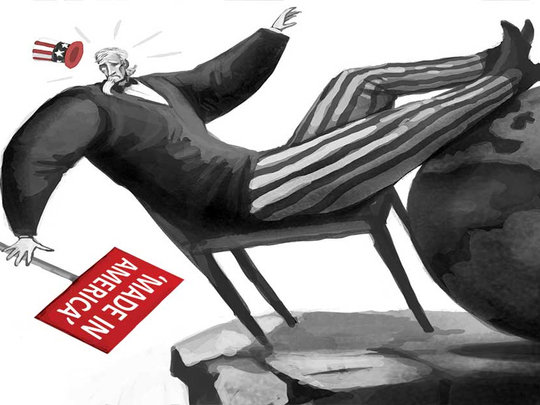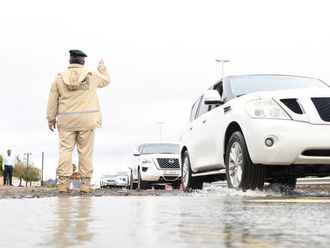
President Donald J. Trump had repeatedly said, “My job is not to represent the world. My job is to represent the United States of America”. That’s a great patriotic sound bite guaranteed to appeal to his following, but he appears to have forgotten that the US is not an island unto itself and isolationist policies will have all kinds of causal repercussions.
For one thing, walling-off his country from its southern neighbour at enormous expense to taxpayers, renegotiating the North American Free Trade Agreement (Nafta) to Mexico’s detriment and threatening multinationals to keep jobs in the US will negatively affect the Mexican economy, eliciting a wave of desperate economic migrants that no wall, no matter how high, will keep out. In fact, a Mexican lawmaker climbed to the top of a 20-foot border fence separating San Diego from Tijuana to make that point.
Secondly, Trump’s protectionist quashing of the Trans-Pacific Partnership (TTP), a trade agreement with 12 Asian nations, not only boosts China’s goal of negotiating a rival bloc with the Association of Southeast Asian Nations (Asean) that if sealed, could choose to apply high tariffs to ‘Made in America’ goods.
Last week, Chinese officials met with their counterparts from 16 Asian countries to discuss an economic partnership. Trump “risks leaving the door open for China to dominate trade in Asia... putting US influence at risk”, warns the Financial Times. Expected soon-to-be-announced higher interest rates are likely to strengthen the dollar, which will not be good news for American exporters.
State Department funding
On the foreign policy front, the US State Department is concerned about the prospect of a 37 per cent reduction to its budget, as well as a 38 per cent cut in foreign aid to allow for an $18 billion (Dh66.1 billion) increase in defence spending. Reducing or cancelling aid programmes in developing countries will harm inter-nation goodwill and diminish America’s ‘soft power’ influence over impacted states.
As former CIA operations officer Luis Rueda writes, “Cutting foreign aid money leaves us with only military action as an option. This is more likely to lead to armed conflict as we would be left with only a hammer as a foreign policy tool.”
A letter signed by retired military officials, foreign policy experts and business leaders quotes Defence Secretary James Mattis in his capacity as Commander of US Central Command saying, “If you don’t fully fund the State Department, then I need to buy more ammunition.”
Secretary of State Rex Tillerson has officially consented to reduce his department’s budget over three years but a leaked memo published by the Washington Post evidences that the department is strongly resisting on national security grounds and America’s potential loss of global engagement and influence. Congressional lawmakers from both sides of the aisle are just as sceptical. Republican Senator Marco Rubio said retreat from the world is bad for security, bad for the economy and “doesn’t live up to the standards of who we are as a people”.
The administration’s soon-to-be-announced travel ban has succeeded in raising the hackles of peoples in seven countries fomenting greater anti-American sentiments while stories from Canadians, Europeans, Britons and others recounting how they were rudely treated by US border guards, detained, forced to reveal social media passwords are beginning to dent the tourism industry, with bookings down by 6.5 per cent.
Trump’s negative attitudes towards the EU, compounded by his self-ascribed title ‘Mr. Brexit’, have naturally piqued European leaders. If anything, his verbal assaults have brought them closer together. Just days ago, the European Parliament voted to end visa-free travel for Americans in retaliation for the US refusal to reciprocate with respect to five EU states — Romania, Poland, Cyprus, Croatia and Bulgaria. The vote is non-binding but if approved, Europe’s tourism sector will feel the pinch; that indicates that Europeans are acting on principal rather than economic self-interest.
On a positive note, Trump’s tough stance on the North Atlantic Treaty Organisation (Nato), more specifically his warnings that members must pay their pledged dues amounting to 2 per cent of gross domestic product (GDP), could pay off. The president says money is now “pouring in”. That’s not exactly true. The coffers have been bolstered due to last year’s discussions, but there are signs that states are taking their commitments more seriously.
Ultimately, unless the president’s self-centred, dare I say selfish, policies are reined in by advisers and lawmakers, at stake are America’s benevolent identity and global standing. Each man, or each country, for itself is in the long run a sure-fire recipe for failure.
Linda S. Heard is an award-winning British political columnist and guest television commentator with a focus on the Middle East.










